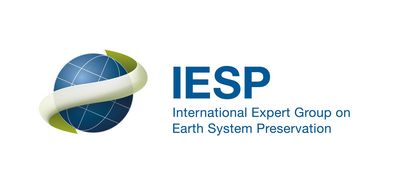IESP e.V. Institute for Earth System Preservation
An international expert network
The IESP is a unique network of scientists, politicians, administrators, and entrepreneurs who have joined forces to provide sustainable, future-oriented solutions to the Earth System crises that challenge us humans in the Anthropocene. Caused by a toxic mixture of excess emission of greenhouse gases and the resulting global warming and climate change, the elimination of biodiversity and ecosystems to satisfy human desires, pollution of the atmosphere, water, and soil, and mismanagement of businesses, countries, and ecosystems, these crises increase social division and threaten international peace.
“Its mission:
to root environmental sciences and technology in the academy’s canon.”

The network specializes in policy advice. It utilizes inter- and transdisciplinary workshops and symposia based on the concept of the Dahlem Conferences® to rally decision-makers in environmental science, humanities, industry, politics, and administration for out-of-the-box exchanges focused on specific environmental problems. From its very beginning, the network has been successful in advising and inspiring politics and political administration with new concepts and ideas through pointed, solution-oriented memoranda. These originate from the IESP’s holistic participatory approach, which engages a multitude of stakeholders, through all generations, in problem-solving dialogues.
In 2002, the IESP began to evolve as the Institute of Advanced Studies on Sustainability (IoS), a sub-institute of the European Academy of Sciences and Arts (EASA). Its mission: to root environmental sciences and technology in the academy’s canon. Following the workshop “The Art of Dealing Wisely with the Planet Earth” in 2008, IoS established the International Expert Group on the Preservation of the Functionality of the Earth System and published its first memorandum, known as the “Zugspitze Declaration.” Since then, the IESP and the TUM Institute for Advanced Study have been collaborating, for example on events, publications, Fellowships, and research projects. In October 2020, IESP chairperson and TUM Emeritus of Excellence Prof. Klaus Mainzer was elected as the new president of the EASA.
Another chairperson of the IESP, TUM Professor for Urban Water Systems Engineering and TUM-IAS host Prof. Dr. Jörg E. Drewes, was appointed a new member of the German Advisory Council on Global Change (WBGU). The WBGU is an independent scientific advisory body of the German federal government, advising policy makers in matters regarding global environmental changes. In addition, Prof. Drewes and several others affiliated with the IESP, such as former TUM-IAS Carl von Linde Senior Fellow Prof. Dr. Annette Menzel and TUM Prof. Dr. Markus Disse have been appointed to a scientific advisory board of the Bavarian State Council on sustaining the free state's water future.
The recently deceased Nobel Prize winner Paul Crutzen, who was among the creators of the IESP, advocated for engineering solutions to solve the Anthropocene’s – mostly anthropogenic – threats to the Earth System. As some of the planetary boundaries sustaining life have already been trespassed, humanity is running out of time. One major problem is excess nitrogen in water and soil. In 2017, to help avoid a penalty from the EU’s then still pending case against Germany for underachieving in fulfilling the requirements of the EC Water Framework Directive (WFD), the IESP secured funding from the Bavarian State Ministry for the Environment and Consumer Protection for an event-based research project called “Agriculture-Water Management-Climate Change. New Perspectives for Agriculture and the Environment.” The recent years’ dryness gives this project a new urgency.
The ongoing project’s main goal is to preserve the systemic self-regulatory forces of nature (here, water and soil) and maintain both their effectiveness and efficiency in the long-term. In addition, it is imperative to resolve conflicts of use between different human stakeholders in agriculture and water management, since these disturb natural processes, which in turn affect social well-being. The protection goals and practical solutions that both enable sustainable agriculture and support achievement of the UN Sustainable Development Goals while feeding a growing world population, which have already been defined for decades, must be implemented. The IESP stands ready to continue and to facilitate the necessary dialogue.
